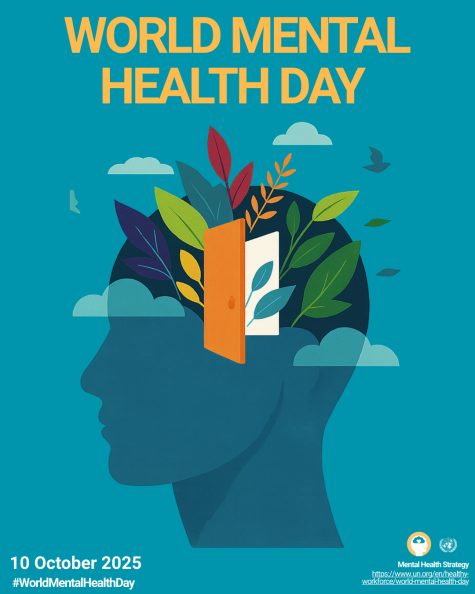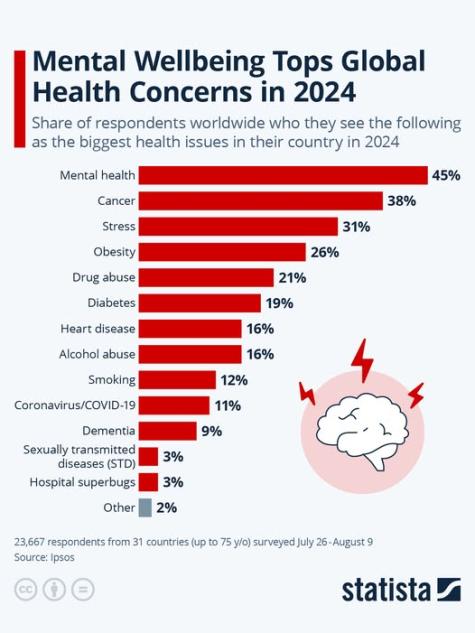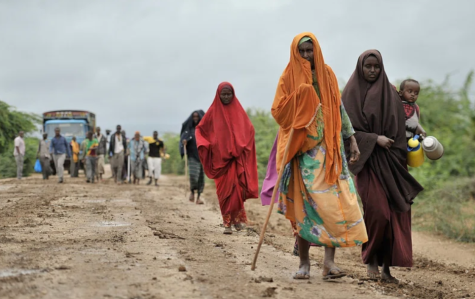World Mental Health Day - October 10

➡️ WORLD MENTAL HEALTH DAY, October 10 - Education, Awareness and Advocacy Against Discrimination
World Mental Health Day serves as a reminder of the importance of mental well-being. The idea of an International Day came from the World Federation for Mental Health, which first celebrated it in 1992.
Around the world, mental health organisations and social justice activists help to raise awareness, advocate for mental health issues, and fight against the social stigma associated with them. The event encourages people to engage in open conversations about mental health, and to promote greater understanding of the wide range of disorders which exist.
With the world struggling under the weight of multiple crises, including raging conflicts, unprecedented numbers of refugees, food insecurity, the climate crisis, the threat of pandemics, inflation and economic crises, high levels of unemployment, widespread poverty, and persistent inequalities, global mental health needs are high.
*****
On 10th October, there will be a groundbreaking, uplifting broadcast from ➡️ Peace One Day with an influential line-up of world-renowned guests—we highly encourage tuning in ;-)
LIVE Stream on YouTube, Twitter / X, Facebook, and LinkedIn
*****
Please share this wonderful resource 2025 on Twitter, Bluesky, Instagram, Facebook, and LinkedIn ;-)
*****
Jump straight to our resources on ➡️ World Mental Health Day
Explore our comprehensive guides on -
- Mental Health Guide
- Children’s Mental Health & ADHD
- Mindfulness, Kindness & Happiness
- Depression, Anxiety & Fear
- Psychiatry
- Autism & Mental Health
- Social Media & Mental Health
- Men’s Mental Health
- The Right to Health
There is no health without mental health. It is an essential element of health, well-being and sustainable development. Yet, mental health care provision is one of the most underfunded and neglected areas of public health. The vast majority of those in need lack access to high-quality mental health services.
“More than 1 billion people worldwide live with a mental disorder” - WHO
*****

The importance of mental health is slowly gaining recognition. There is still much work to be done to ensure that adequate support and resources are available to those who need them the most.
World Mental Health Day is the perfect opportunity to call for governments to improve mental health policies and access to mental health services, address the root causes of the mental health crisis, and finally prioritise mental well-being as an essential part of life.
Mental Health Facts & Statistics
- On average, countries dedicate just 2% of their health budgets to mental health.
- Two-thirds of countries have only one psychiatrist for every 200,000 people.
- Fewer than one in ten people with a major depressive disorder receive even minimally adequate treatment globally.
- Nine in ten people with mental health problems experience stigma and discrimination.
- More than 56% of people with mental health disorders have experienced stigma and discrimination by their employers.
- Globally, suicide accounts for more than one in every 100 deaths. For each death, there are 20 suicide attempts.
- Suicide is the third leading cause of death among 15–29 year-olds.
- Annual global productivity losses for depressive and anxiety disorders alone are estimated to be $1 trillion.
- The Covid-19 pandemic caused a 26% rise in anxiety and a 28% rise in major depressive disorders in 2020 alone.
*****

The Male Mental Health Crisis
The pressures of modern society and the tendency for men to trivialise the importance of mental health have resulted in male suicide rates 4 times higher than in females. With only one in five men seeking professional help regarding feelings of depression, suicide is now a leading cause of death for men aged under 50.
- One in ten men experience depression or anxiety.
- Of those who are diagnosed with schizophrenia before the age of 30, 90% are men.
- Loneliness is a significant factor in developing depression; 15% of men say they have no close friends at all.
Excellent resources for further reading include the WHO 2025 Report – World Mental Health Today and the WHO 2024 Mental Health Atlas.
*****
Adolescents & Mental Health
Mental health concerns in children and young people have been increasing since the release of smartphones. Between 2005 and 2017, symptoms of major depression in young people increased by 52%. Teens now spend an average of eight hours a day on screens, primarily gaming or on social media platforms.
Even though it is widely understood that social media has negative impacts on younger people, its addictive nature makes it hard for people to stop using it. Spending more than 3 hours a day on social media puts young people at a much higher risk of developing mental health issues.
Today, 13% of children aged 12-17 report depression and 32% report anxiety. Young adults aged 18 – 25 report 25% mental illness. These age groups report high usage of social media.
The young people's mental health crisis is a global phenomenon. It has been amplified by the covid-19 pandemic, eroding opportunities for play, a prolonged transition into adulthood, growing economic uncertainties, and a willingness to disclose struggles. In the UK, for the age group 10–24, mental health disorders now account for a staggering 45% of the overall disease burden.
Young people are our future world leaders, policy makers, educators, and caretakers of our planet; their mental health is a collective issue. We must build a world where the next generation has the tools, support and environment they need to lead fulfilling lives in today's modern world. Participation in meaningful activities, autonomy, competence, and connection are essential components for everyone, but especially for young, developing minds.

2025 Theme - Mental Health in Humanitarian Emergencies
This year’s World Mental Health Day theme, “Access to services – mental health in catastrophes and emergencies,” underscores the importance of protecting the mental health of individuals affected by war, humanitarian crises, climate change, or other vulnerable communities. It also includes the healthcare professionals who deliver this invaluable work in times of great danger or crisis.
Set each year by the World Federation for Mental Health, the 2025 theme is especially poignant given that the world is currently experiencing the highest number of armed conflicts since 1945.
At the end of 2024, 1 in every 67 people on Earth had been forcibly displaced due to persecution, conflict, violence, natural disasters, or human rights violations. These individuals lack access to fundamental rights, including education, healthcare, employment, and freedom of movement. They are highly vulnerable to mental health conditions such as PTSD, depression, and anxiety. These are the very same people who have the least access to mental health services.
Supporting these people saves lives, it gives them the strength to cope, the tools to be resilient, and the space to heal and rebuild.
“On this World Mental Health Day, let us intensify our efforts to create a world where mental health is valued, protected, and accessible for all, especially in the face of adversity” - WHO
Author: Rachael Mellor, 25.09.25 licensed under CC BY-SA 4.0
For further reading on World Mental Health Day see below ⬇️
- United Nations Campaigns - World Mental Health Day (WMHD)489609
- World Mental Health Day - WHO 489025
- World Mental Health Day 2025 - UN Poster489612
- WHO - World Mental Health Day 2025492377
- Mind - World Mental Health Day 2025492375
- Intro Video WMHD 2025 - UN489613
- Peace One Day - #MentalHealthDay2025489614
- World Mental Health Day - Wikipedia489024
- Report: World mental health today - Latest data - WHO 2025 *.pdf489518
- Report: Mental Health Atlas - WHO 2024 *.pdf489517
- Mental Health and Wellbeing - United Nations489495
- World Federation for Mental Health - WFMH489027
- World Federation for Mental Health - Wikipedia489026
- United for Global Mental Health - UnitedGMH489611
- Hub of Hope (UK) - mental health support directory489510
- Hub of Hope - Resources489511
- MHPSS MSP - The Mental Health and Psychosocial Support Minimum Service Package492383
- Mental Health Foundation (UK)489607
- Global mental health - Wikipedia489028
- Google News - Topic489030
- Google News489029
- YouTube Search489031
- #WorldMentalHealthDay489033
- #WMHD25492349
- #MentalHealthDay2025489615
- #MentalHealthDay489515
- #WMHD2025489032
- #WMHD489034
- Papyrus (UK) - WMHD 2023489610
- Project Healthy Minds - Variety489496
- Message from the WFMH President, 2025492390
- Ensuring a coordinated and effective mental health response in emergencies - WHO492388
- World Mental Health Day 2025 Webinar - WHO 10.10.25 14:00 – 15:00 CET492379
- Today’s World Mental Health Day: 4 Real Ways You Can Help - VICE 10.10.25492849
- World Mental Health Day - Mind 10.10.25494522
- World Mental Health Day: New IFRC report reveals why mental health must be part of any emergency response. - ICRC 10.10.25492848
- Video Series – Raising Mental Health Voices: Showcasing Wellbeing - WMDHD Official 10.10.25492391
- Video: Ethiopia - Emergencies preparedness: Mental Health and Psychosocial Support - WHO 08.10.25492381
- Webinar – The Cultural Wisdom, Connected Care: Negotiating Crises and Challenge in the Pacific Region - WMHD Official 07.10.25 9am-10.30am (AEDT)492393
- Tweet: Youth #mentalhealth is in crisis. Primary care teams must be trained to detect and treat mental health problems in young people in time. Early care improves lifelong o…492350
- World Mental Health Day - UCL 25.09.25490747
- Prince Harry and Meghan to Be Honored at Project Healthy Minds’ World Mental Health Day Festival - Hollywood Reporter 25.09.25490748
- Video: What is the Mental Health and Psychosocial Support Minimum Service Package? - WHO 10.09.25492382
- Deepak Chopra, Lukas Graham, Katie Couric and More to Headline Project Healthy Minds’ World Mental Health Day Festival & Gala - Variety 10.09.25490749
- Publication: World mental health today: latest data - WHO 02.09.25492389
- Refugee and migrant mental health - WHO 01.09.25492387
- Turn World Mental Health Day Into Year-round Action - National Council 9/25489498
- Deepak Chopra, Lukas Graham, Katie Couric and More to Headline Project Healthy Minds’ World Mental Health Day Festival & Gala - Variety 9/25489497
- World Health Organization advocates for mental health awareness as Elizabethtown College celebrates World Mental Health Day - Etownian 9/25489499
- Video: Addressing mental health needs of refugees and migrants - WHO 14.08.25492384
- Mental health in emergencies - WHO 06.05.25492386
- A Disturbing but Hopeful Conversation with ChatGPT On Evil, Destruction, Social Media and a Better World - Norbert Stute & AI 5/25489455
- On World Mental Health Day, WHO/Europe calls for urgent action to strengthen the mental health of the health and care workforce - WHO 10.10.24490750
- 60 uplifting quotes that honor World Mental Health Day - Today 10.10.24492268
- Video: Jonathan Haidt sits down with Prince Harry on World Mental Health Day 10/24 (must watch)489508
- Video: Picking up the phone on World Mental Health Day - McLaren 10/24489506
- Video: World Mental Health Day 2024 - Nile University 10/24489507
- Video: 7 Actions To Take This World Mental Health Day - headspaceAustralia 10/23489505
- Video: H.E.R. x Sadhguru - World Mental Health Day Talk 10/23489512
- Video: World Mental Health Day 2023 - Let's go wellbeing 9/23489509
- Video: Mental Health for All: World Mental Health Day Planning (2/2) - Global Mental Health Action Network 9/23489513
- Video: Creating Mental Health & Wellbeing | Sadhguru on Yoga 5/23489514
- #MHForAll Webinar: State of the World’s Mental Health Today - Global Mental Health Action Network489516
- Video: World Mental Health Day Speaker Event 2022 (Focus on Burnout) - Howard Center 10/22489519
- Video: Celebrating World Mental Health Day - Peace at Home Parenting 3/22489520
- Video: Building sustainable mental health systems during and after emergencies - WHO 03.12.20492385
- World Mental Health Day: an opportunity to kick-start a massive scale-up in investment in mental health - WHO 8/20489608
- Mental Health in Children
- Mental Health
- Mindfulness
- KINDNESS
- SOCIAL MEDIA
- Words of Caution - addiction, distraction, loss of productivity, mental health
- Digital Detox
- ADHD
- Autism in Adults
- Autism
- Fear & Depression
- Climate Adaptation & Resilience
- Mobbing & Bullying
- Creation of Happiness
- Happiness
- Anti Consumerism & SIMPLE LIVING
- Prince Harry (UK)
- Loneliness